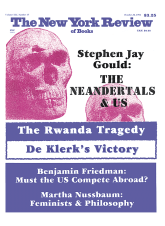Jimmy Carter may not have been earliest in perceiving that President Clinton’s foreign policy is a vacuum, but he has been fastest in filling it with himself. For fourteen years come November, he has been carrying the smile that proclaims his wound through incessant voyages in pursuit of a cure. He has wandered as any pilgrim must when he has no clear idea of the shrine he seeks except that it is built for him. For a while he floated about as an international statesman whose only portfolio was a heart eager for office temp employment as ambassador from Saddam Hussein or Kim Il Sung.
At points in his pilgrimage Carter made a singularly useful private citizen; and his career would never again have known a blotch if he could curb his lust to be a public man once more.
His opportunity to fall came his way last spring. The Clinton administration had puffed up the peril of North Korea’s nuclear potential rather beyond need and too far beyond this president’s taste for forcible action.
Jimmy Carter, private citizen, took wing to Pyongyang, alighted to Kim Il Sung’s courtesies, and emerged to describe him as “charming,” Carter’s favored adjective for statesmen otherwise ill-famed. He was persuaded that Kim would be reasonable and agreeable and the President welcomed the assurance, since agreeability is his pole star. North Korea was thereafter consigned to the cemetery of forgotten menaces.
But Carter had marked Clinton as one of those men whose engagements with troublesome problems progress unvaryingly through stages of indecision to arrival at inanition. Carter could wait his time certain that his chance to seize his advantage was sure to come, and so it did in Haiti.
Clinton had paltered so long that events had overtaken him. He had let himself slide toward having to do the last thing he had ever wanted to do. Then Jimmy Carter threw out a rope. Clinton was a swimmer in distress and what could he do but concede the lifeguard full play with the line?
And so Carter picked the mission to General Raoul Cédras, who would not stoop to traffic with any creature so lowly as the President’s national security adviser. Carter enjoyed himself awhile in his old role as a despot’s short-term ambassador to Washington, dined with the Cédrases, and as ever found him charming and her even more so. He then accepted a deal more than implying amnesty for the whole catalog of crimes committed by the regime and the least of its servitors until October 15.
Having left Haiti’s cops their license to beat two demonstrators to death with presumable impunity that first Tuesday, Carter returned in triumph to lecture the President in public for having mistaken Cédras for a dictator.
This performance especially disturbs for an ignorance of three years of Haitian history that is shocking even in a former president of the United States. All the time he was tirelessly gadding about, Carter was too lazy to inform himself about a record whose monstrosities demand extremities of mercy for sparing their doers from hanging higher than Haman.
The New York Times of September 21 published a Carter interview with Maureen Dowd, a young woman as richly endowed in head as she is beguiling in manner and dangerous to meet when you walk on shaky ground. In its course, Carter remembered that, when the United Nations was debating its mobilization against Saddam Hussein, he had undertaken to write the heads of the Security Council states and urge them not to go along with George Bush’s wishes.
He described that action as “not appropriate, perhaps.” One could well think of harsher appellations. Raising his objections to his countrymen would, of course, have been appropriate, although I cannot recall his doing so with conspicuous fervor. Instead he addressed private letters to foreign potentates in a design to rally them against his own government. Such is the pretentious effrontery inescapable for anyone who sets himself up to persuade the voters that they were wrong not to reelect a saint.
—September 22, 1994
This Issue
October 20, 1994



